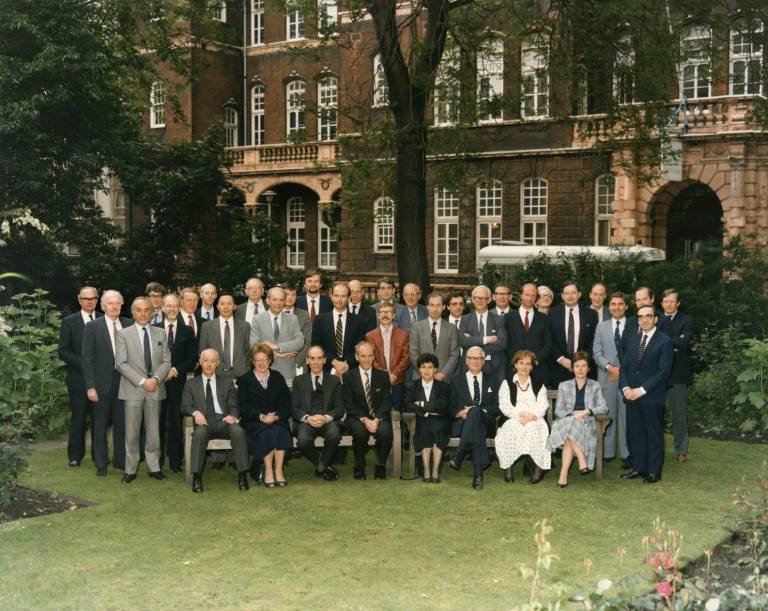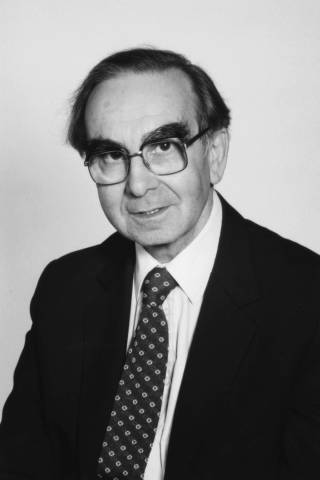Professor Isabel Pavao Martins shares her recollections of Queen Square.
What are your fondest memories of your time at Queen Square?

I started my House job at the National Hospital in the summer of 1985. I came from Lisbon where I had completed my medical internship and had already acquired some training in neurology. Queen Square was considered the best place for neurology in Europe and I had great expectations for the coming months. They were completely fulfilled. The National Hospital was a unique combination of a very stimulating academic and scientific environment with excellent clinical activity. The Victorian building and the surrounding Institutes contained a vibrant community of clinicians and researchers, from all over the world. That was very inspiring for a young doctor, as I was then.
I very much enjoyed being part of it. Getting to know the people, the rules and the House, while having the opportunity to observe and discuss many patients and to be mentored. It shaped me as a professional and as a clinician. I was also deeply impressed by the perfect organisation that made everything go quite smoothly.
I must say I appreciated many small details that were part of the daily life of Queen Square. Walking through the quiet square in the morning, picking up the list of planned admissions in the lobby, the liturgy of the ward rounds, the informal discussions over lunch, the feedback from the therapists and social services and the occasional visit to the ward by legends of neurology that I only knew from articles: Ian McDonald, David Marsden, Ralph Ross Russell, Roger Bannister, Anita Harding and PK Thomas. Besides the clinicians, the quality of all supporting services was quite impressive. I especially remember Brenda, a social worker who could achieve things that seemed impossible. I have good memories of Sister Nora Heard, with whom I liked to talk and who gave me useful tips about the local rules.
What are your memories of Drs Blau, Morgan-Hughes, Schott and Scadding?

I have very fond memories of all of them and I continue to quote them to my residents and students. They had different personalities and complementary interests.
Dr Blau had a more lasting influence on me, because of my interest in migraine and headache. He enjoyed teaching and questioning people about their ideas and appreciated good discussions and short assertive answers. He was brought up in traditional neurology, before the advent of imaging exams and relied more on physical examination. There was a story about a bet he made with colleagues that he could perform a full neurological examination in less than five minutes. During a conference, he managed to demonstrate this on the stage. He had the most extraordinary ability to analyse and dissect the symptoms of headache. He conceived a model about the development of migraine attacks that is nowadays essential to our understanding of this disorder. Most of his ideas came from the observation of patients and from his insight. He taught me how to look at uncertainties and transform them into research questions. We kept in touch over the years. He came to lecture at the Portuguese Society of Headache more than once and I was honoured to be invited to have dinner with him and his wife in their house in London. I was very sorry to hear about his death.
Dr Morgan-Hughes was a very enthusiastic and strong personality, who never lost an opportunity to discuss mitochondrial diseases, his main interest. We had long ward rounds with him, always beginning with tea served at Princess Christian Ward which was quite nice. He took time to talk to patients and always demonstrated physical signs to the junior staff, quoting authors and articles on the topic. He was very knowledgeable. He admitted patients with chronic fatigue, now called fibromyalgia, that he found very intriguing. I remember his very large outpatient clinic on Wednesday afternoons, where I enjoyed participating and discussing cases with him.
Dr G Schott and Dr J W Scadding were young consultants at the time. They were both more dedicated to chronic pain but also interested in movement disorders. They referred patients from the Orthopaedic Hospital and the Brompton and admitted patients with chronic pain to receive nerve blocks at Queen Square. They were very professional and my most vivid memories of them concern their caring attitude and their gentle way of relating to the patients, which I still take as a model.
I believe that you are currently working as a Consultant Neurologist in Portugal, could you tell us a little bit about this?
I have a double attachment with the Faculty of Medicine, University of Lisbon and the University Hospital of Sta Maria in Lisbon. My work is divided between clinical work, mostly in the Headache Outpatient Clinic, teaching undergraduate students, activities related to Medical Education (we are currently reforming the Clinical years of the Faculty) and research.
Since leaving Queen Square what have you be working on? Is there any area of research that you are working on at the moment?
I have been working mainly on two areas of Neurology: Headache and Behavioural Neurology.
I studied headaches developing during endovascular procedures, as a model of vascular headache and cognitive dysfunction associated to migraine attacks, symptoms that are quite common but were overlooked for a long time and do not occur in other primary headaches. More recently we performed a neurophysiological study to try to predict migraine attacks. There has been so much development in the headache field in the last decade which makes it a really a good time to dedicate to this topic.
On Behavioural Neurology I did some research on language disorders and on the long term impact of early brain lesions, which was the topic of my PhD thesis. We have also been studying subjective language complaints and proper name anomia. I am lucky to have a group of very talented junior doctors and researchers interested in cognitive neurology who are working with me, since time seems to shorten as we age.
What do you think of as your greatest achievement as a clinician/researcher?
That is very difficult to say... I hope I have been able to improve the life of my patients and to stimulate students to become good doctors and to contribute to the field of neurology and neurosciences.
 Close
Close

